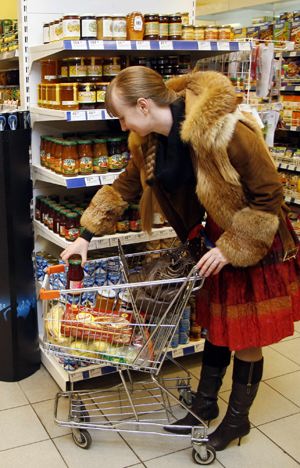Sanitary standards
Suppose Ukraine masters the European model and Russia responds with unfriendly competition. Then what?
Ukraine’s food quality control system (all the way from the producer to the consumer) will be upgraded to meet the European standard. There will be a single authority responsible for food quality control. This issue is being dealt with by several government agencies and the reform boils down to delegating all controlling powers in this domain to a single “competent body,” namely the State Veterinary and Phyto-Sanitary Service (Ukrainian abbreviation, Derzhvetfitosluzhba) of Ukraine.
This controlling authority started being formed after establishing the State Veterinary and Phyto-Sanitary Service under the aegis of the State Committee on Veterinary Medicine. In 2011, amendments were made to 12 laws on the strength of which cabinet resolutions and directives were issued. In other words, the legal framework is ready. According to Ivan Bisiuk, head of the Derzhvetfitosluzhba, his agency will have all the controlling powers before April 2012, and that a detailed action plan will shortly be submitted to the Cabinet of Ministers of Ukraine.
Such an authority had to be established to help Ukraine get closer to European legislation. “The Derzhvetfitosluzhba of Ukraine will rely on the EU’s experience of keeping food quality and safety under control, including the use of organic and mineral fertilizers, fodder, checking for traces of pesticides and veterinary agents in products of animal origin, monitoring the processing of herbal and animal raw materials, keeping track of quality supplies to consumers, and of all logistics and distribution networks in Ukraine,” says Ivan Bisiuk, adding that this “doesn’t mean that from now on veterinarians will be the only ones to keep a careful eye on herbal products, special diets, or baby food. Precisely with this in mind, this competent authority will have on payroll experts on food hygiene, phyto-sanitary control, quarantine, and protection of plants. Until this newly created authority masters all of its functions, it will be assisted by sanitary-hygienic specialists.
Interfax quotes Gennadii Onishchenko, head of Rospotrebnadzor, as saying that Russia took a dim view of Ukraine transferring food quality control to the veterinarians. Russia’s sanitary service will have to toughen border checkpoint clearing procedures and may enforce restrictions on Ukraine’s farming imports: “We will start watching closely every agrarian shipment from Ukraine, primarily in terms of dairy products, and we will take draconian measures once we spot the slightest deviation from set quality standards. This will cause Ukraine’s small and medium business to suffer in the first place, considering their regular supplies to Russia’s border regions and big cities.”
The Derzhvetfitosluzhba of Ukraine chose to ignore this demarche. When asked for comment by The Day, Bisiuk said that “there will be no risks involved,” and that this transfer of controlling powers couldn’t build any obstacles on the road of Ukraine’s exports to Russia; that the Derzhvetfitosluzhba would have no problem discharging its functions: “There is this Soviet cliche about a vet being different from a doc, that they can’t be compared. We can see such competent authorities across the world, and that among their members are vets, biologists, physicians, physicists, all who can secure proper quality monitoring. The very name, the State Veterinary and Phyto-Sanitary Service, implies that this organization has on payroll veterinarians, agronomists, zootechnicians, and physicians.”
Ukraine’s Foreign Minister Kostiantyn Hryshchenko responded to Russia’s angry reaction, voiced by Onishchenko, by saying he couldn’t figure out what was wrong with the European food quality control experience Ukraine was trying to utilize. He further suggested that Onishchenko, being Russia’s Chief Sanitary Inspector, apologize in public.
Experts believe that Onishchenko’s harsh statement won’t create any big problems for Ukraine’s farming exports to Russia in the nearest future, considering that most such products are being controlled by the Derzhvetfitosluzhba and carefully checked by sanitary authorities before being cleared for entry to Russia. Yelizaveta Sviatkivska, an expert with the Ukrainian Agribusiness Club, agrees with this and greets the food quality control reform: “This decision is a move aimed at harmonizing Ukrainian and European legislation. There must be a single competent authority that will make the producer-supplier-consumer chain transparent and simple to figure out. Then we’ll know who is responsible for what, and how to bring them to account, if and when.”
Last but not least, a reduction in the numbers of such controlling authorities will lower production costs. A businessman [in Ukraine] has to pay twice for having the same indices checked by various controlling authorities. Sviatkivska believes there will be problems in this transit phase, in terms of expert personnel and redistribution of the spheres of influence, yet this will produce a positive result in the long run, by helping Ukrainian business on the European market.






